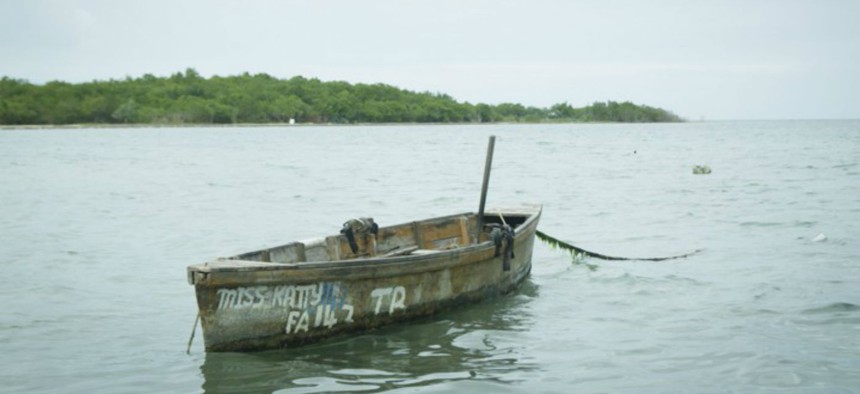The Coast Guard did immediately provide comment. But the alleged episode shows how the United States is waging one of its biggest battles in the War on Drugs miles from American shores and largely out of sight. President Donald Trump has railed about drugs “pouring across the border” from Mexico; lawmakers have decried the “epidemic” of painkiller abuse at home. It’s the United States Coast Guard, though, that seizes more drugs than any other law-enforcement agency in the country. And the alleged abuses show what can happen when the reach of American law enforcement outstrips the protections of the American constitution.

ACLU photo
ACLU Alleges Coast Guard Detained and Abused Fishermen
A lawsuit says the agency accused innocent men of drug smuggling, chained them to decks, and sailed with them straight into a hurricane.
One night in the fall of 2017, four Jamaican fishermen set out into the Carribbean from the village of Half Moon Bay. As a lawsuit filed today describes it, their quest for tuna and snapper was supposed to last about two days. Then they disappeared.
Five weeks later, those men—Robert Dexter Weir, Patrick Wayne Ferguson, Luther Fian Patterson, and David Roderick Williams—reemerged in Miami, covered in burns and blisters, according to the American Civil Liberties Union. United States Coast Guard officers had snatched them off their boat on suspicion of marijuana smuggling, then held them at sea for more than a month, shuffling them among various vessels en route to the U.S. to face trial, alleges the ACLU, which is suing the Coast Guard on the men’s behalf. The ACLU claims that Coast Guard officers chained the fishermen up on decks exposed to the elements—even while sailing straight through Hurricane Maria—fed them little, and denied them contact with their loved ones. When they finally reached a U.S. courtroom, they were never convicted of a drug crime, since the ACLU says no drugs were ever found on the boat; they pleaded guilty to lying to investigators because, according to the suit, their attorney told them it was the fastest way to get home.
The ACLU argues that indefinite detentions of the kind it says its clients suffered are inhumane and illegal. Steven Watt, a senior staff attorney with the ACLU, told me his clients were essentially “forcibly disappeared” for weeks. Since they couldn’t speak to their families, Watt said, their loved ones were “were preparing for their sons’ and fathers’ deaths.”
“I think I never sleep one minute,” said Keisha Brown, Ferguson’s partner, in a video produced by the ACLU. “I don’t know how. I can’t describe that feeling. It’s a horrible feeling.”
“This case was not an isolated incident,” Watt told me. A New York Timesinvestigation last year alleged another case of detainees held in similar conditions, likening the detentions to “floating Guantánamos.” In that case, though, the suspects pled guilty to drug smuggling and never challenged the conditions of their detention in court. The ACLU maintains that its clients’ detention was never justified in the first place.
The Coast Guard has racked up enormous successes in its maritime drug battle, routinely seizing tons of cocaine at sea and bringing hundreds of suspected smugglers to face trial in the U.S. Last year, the agency took more than 200 metric tons of cocaine off the market and detained more than 600 alleged smugglers, a large number of whom were then convicted of smuggling offenses in U.S. courts.
But it’s what happens before they get to trial that especially worries the ACLU. Given that the Coast Guard often detains suspected smugglers hundreds of miles from U.S. shores, the protections of the U.S. justice system—such as prompt access to an attorney—are out of reach. Detainees spent an average of 16 days at sea last year, according to the Coast Guard. That’s a period of legal limbo.
Or worse. The ACLU’s complaint alleged that the Coast Guard officers, none of them named in the document, forced the four men to strip and wear paper-thin coveralls, gave them a metal bucket to defecate in, and refused to give them so much as a tarp for shelter as Hurricane Maria bore down on them. (The Coast Guard did not immediately comment on this specific allegation.) Lieutenant Commander Scott McBride, a Coast Guard spokesman, describing the agency’s policy in an email before the lawsuit was filed, said: “The Coast Guard treats each person with dignity and respect while ensuring the safety of our crew, safety of the detainees and the integrity of ongoing law enforcement operations.”
The ACLU also claims the men were never smuggling drugs at all. The Coast Guard initially boarded their boat on suspicion of marijuana trafficking, according to the complaint, but found no drugs on the boat. The men were tried, convicted, and did time in the U.S.—not for a drug-related offense but for lying to investigators about where they were headed. “At the time they were picked up, they were lost,” Watt said. “They didn’t know where they were going. But they took a plea to [lying so] that they could get home quicker.” They served about a year in a U.S. jail. Since returning to Jamaica last year, according to the complaint, they have struggled to pick their livelihoods back up since the Coast Guard destroyed their boat.
“I was going to do something to help myself and help my family,” Williams says in the ACLU video. “And it wasn’t nothing illegal. It was fishing.”
The Coast Guard’s drug-war battlefield spans millions of square miles of open sea. Admiral Karl Schultz, the Coast Guard commandant, said at a recent budget hearing that in the eastern Pacific, where most of the world’s cocaine is trafficked, his agency can detect probably about 80 percent of the drug movements. “It’s fishing vessels, it’s these low-profile vessels,” he said. But he went on to say that the Coast Guard only has the capacity to stop about 20 to 30 percent of what it thinks is out there. Thousands of tons of cocaine still end up in the United States every year.
The New York Times reported in its investigation that the maritime drug battle intensified beginning in 2012, when the Defense Department launched a campaign against South American smuggling routes. Since that year, Coast Guard detentions have soared from an average of 200 a year in the 1990s and 2000s, according to the Times, to triple that in 2018. Between 2012 and 2018, McBride said in his email, the agency detained some 3,300 suspected smugglers. (He noted that in the past year it also boarded and searched 100 vessels without detaining anybody, due to lack of evidence.)
Of those detained, McBride said, some 2,600 were brought to the United States to stand trial. Getting them there is a “complex logistical endeavor,” he said, but the aim is to bring them to shore as quickly as possible. This is difficult, though, since the Coast Guard does about 85 percent of its work in the eastern Pacific, south of the West Coast of the United States, but most of the prosecutions take place in Florida, on the other side of the country—where the Justice Department has teams experienced in dealing with such cases, and where courts have taken a broad view of the Coast Guard’s authority to stop drug smuggling even when the product is not bound straight for the U.S. And Coast Guard cutters were never designed for prolonged detentions.
“You don’t have jail cells on vessels. I don’t know any nation that has jail cells on vessels,” Craig H. Allen, the Judson Falknor professor of law at the University of Washington, told me. The ships are always full and the crew never knows how many people they might pick up when they set out. “So where are you going to put them?” Allen, who is a retired Coast Guard officer, said that when he served, detainees would be restrained and, in warmer climates such as the Carribbean, might be kept in the hangar deck, a covered space for a helicopter.
“You need to restrain them, and the unfortunate fact is that they’re shackled to what we used to call a strongback,” like a beam secured to the deck to keep their movements limited, he said. “And there would be guards as well. You have to understand, these people are facing felony charges, and some of them might well get desperate. So you always restrain them.”
Some have questioned the Coast Guard’s right to detain so many suspected drug smugglers at all. As Schultz noted at the hearing, many of the drugs interdicted this way aren’t immediately destined for the United States anyway, raising the question of what jurisdiction a U.S. law-enforcement agency has, and why the suspected smugglers are a problem for U.S. courts. But U.S. law states that insofar as drug trafficking threatens the United States—since many drugs trafficked eventually make their way to U.S. shores—it’s well within American law enforcement’s remit to detain and prosecute suspects.
“[The government’s] current position seems to be that they can detain them for as long as it takes the DEA and DOJ to get their act together to mount the prosecution,” Watt said. But there’s no real oversight, he said, of whether the duration of any given detention is reasonable, or of how suspects are treated in detention.
“I’m troubled by the fact that we don’t exactly knock ourselves out to take people ashore more promptly,” Eugene Fidell, a Yale law professor and former Coast Guard lawyer, told me. “Particularly if the vessels are not capable of keeping arrested persons in reasonable conditions of pretrial confinement.”
The Coast Guard’s current practices have echoes of its Prohibition-era efforts against rumrunners at sea, he said, which involved taking aggressive enforcement measures regardless of where the smugglers’ cargo was actually bound. “We went from a rum war to a war on drugs,” he said. “But the use of the war metaphor speaks volumes.”







